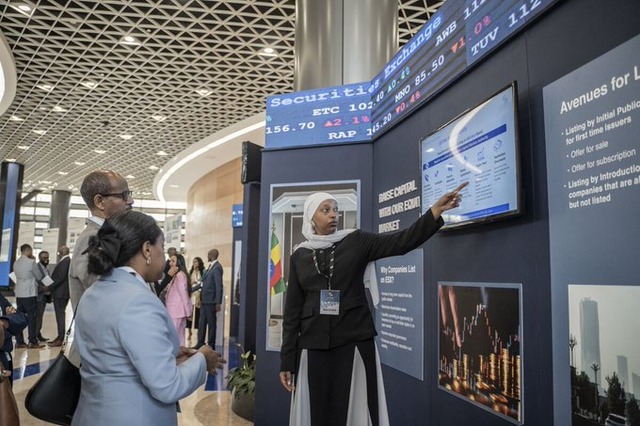 Historic Moment: The launch of the Ethiopian Securities Exchange (ESX) marks a new chapter in the country’s economic transformation, paving the way for growth, investment, and global engagement. (Photo: ESX)
Historic Moment: The launch of the Ethiopian Securities Exchange (ESX) marks a new chapter in the country’s economic transformation, paving the way for growth, investment, and global engagement. (Photo: ESX)
Tadias Magazine
Updated: January 10th, 2025
New York (TADIAS) — Ethiopia has made a historic stride in its economic evolution with the launch of the Ethiopian Securities Exchange (ESX). This new exchange marks a significant addition to the country’s financial infrastructure and underscores commitment to fostering a more open, diversified economy. With Wegagen Bank as the first listed company and the upcoming public offering of Ethio Telecom, the ESX is setting the stage for future growth and new investment opportunities.
For a nation that has long maintained a tightly controlled economy, this move signals a major shift towards privatization and economic liberalization, offering a path for greater engagement with global markets. Over the next decade, the ESX is expected to host up to 90 companies, creating a dynamic platform for both domestic and international investors.
The launch of the ESX is expected to drive job creation, infrastructure development, and a greater influx of capital into the country.
Beyond being a financial milestone, the launch of the ESX represents a pivotal moment in Ethiopia’s economic transformation. It lays the foundation for future generations to actively contribute to the country’s promising trajectory toward prosperity.
Ethiopia’s stock exchange is more than just a financial development—it’s a symbol of growth, resilience, and a forward-looking vision for the future.
—-
Reuters: Ethiopia launches stock exchange in fresh step to liberalise economy
By Dawit Endeshaw
January 10, 2025
ADDIS ABABA, Jan 10 (Reuters) – Ethiopia launched a securities exchange on Friday, in what officials touted as a milestone in Prime Minister Abiy Ahmed’s drive to open up the country’s tightly controlled economy to private investment.
Just one company, Wegagen Bank, was initially listed on the Ethiopian Security Exchange (ESX), although ESX chief executive Tilahun Kassahun said he expected 90 companies to eventually join over the next 10 years.
State-owned telecom Ethio Telecom, which is preparing for an initial public offering, is also widely expected to list shares on the exchange.
“In a historic milestone for our economic and financial landscape, we have officially rung the bell to launch the Ethiopian Securities Exchange,” Prime Minister Abiy Ahmed said in a post on the X platform.
Ethiopia, Africa’s second most populous country with around 130 million people, had a securities exchange in the 1960s and 70s, but it was abolished by the socialist military government that overthrew the monarchy in 1974.
It has registered some of the continent’s fastest economic growth rates for years. Abiy’s moves to liberalise the economy since coming to power in 2018 have attracted interest from foreign companies, including Kenya’s Safaricom (SCOM.NR), opens new tab, which won the country’s first private telecoms licence in 2021.
However, progess has been slowed by armed conflict in several parts of the country, including a 2020-2022 civil war in the northern Tigray region that killed hundreds of thousands. Some investors have also raised questions about the government’s true commitment to liberalisation.
Mark Bohlund, a senior credit research analyst at Redd Intelligence, said he doubted there would be significant foreign interest in the securities exchange.
“I think Ethio Telecom is the only company which would come close to the financial reporting and liquidity requirements to attract foreign investors,” he said.
Still, Ethiopian investors called it a historic moment in the country’s economic evolution.
“For the first time, local investors can become true stakeholders in Ethiopia’s largest companies,” Henok Assefa, the founder of Precise Consult, an Ethiopian investment and economic development advisory, told Reuters.
Ethiopia defaulted on a Eurobond payment in late 2023 but secured an International Monetary Fund support programme last July after letting the birr currency float, easing a liquidity crunch.
—
Join the conversation on X and Facebook,

























